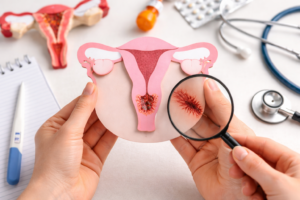The journey to parenthood can be a challenging one, especially when faced with male infertility. However, with modern medical advancements, the path from diagnosis to fatherhood is more promising than ever. This comprehensive guide will walk you through the process of identifying, treating, and overcoming male infertility, offering hope and practical insights for couples on their journey to parenthood.
Understanding Male Infertility
Male infertility affects approximately 15% of couples trying to conceive. It occurs when a man’s reproductive system is unable to contribute effectively to conception. The causes can range from lifestyle factors to medical conditions, making proper diagnosis crucial for effective treatment.
Common Causes of Male Infertility :
1. Low sperm count (oligospermia)
2. Poor sperm motility (asthenospermia)
3. Abnormal sperm shape (teratospermia)
4. Blockages in the reproductive tract
5. Hormonal imbalances
6. Genetic factors
7. Environmental influences
8. Certain medications
9. Varicoceles (enlarged veins in the scrotum)
10. Lifestyle factors (smoking, alcohol, obesity)

The Diagnosis Process
The first step in addressing male infertility is a thorough diagnosis. This typically involves:
1. Medical History Review: Your doctor will discuss your overall health, lifestyle, and any factors that might affect fertility. This includes past illnesses, injuries, surgeries, and current medications.
2. Physical Examination: A general exam and specific examination of the genital area can reveal physical issues affecting fertility. This may include checking for varicoceles or other structural abnormalities.
3. Semen Analysis: This crucial test evaluates sperm count, motility, and morphology. It’s often repeated to ensure accurate results, as sperm quality can vary from day to day.
4. Blood Tests: Hormone levels are checked to ensure proper reproductive function. This includes testosterone, follicle-stimulating hormone (FSH), and luteinizing hormone (LH).
5. Genetic Testing: In some cases, genetic factors contributing to infertility are explored. This may include tests for chromosomal abnormalities or specific gene mutations.
6. Imaging Studies: Ultrasounds or MRIs may be used to check for physical abnormalities in the reproductive organs or to identify obstructions.
7. Specialized Tests: In certain cases, doctors may recommend tests like sperm DNA fragmentation analysis or anti-sperm antibody tests.

Treatment Options
Once a diagnosis is established, your fertility specialist will recommend appropriate treatments. These can range from simple lifestyle changes to advanced medical procedures.
1. Lifestyle Modifications
– Quit smoking and limit alcohol intake to boost fertility and overall health.
– Achieve a healthy weight with balanced diet and regular exercise.
– Manage stress effectively using relaxation techniques or seeking counseling.
– Avoiding excessive heat exposure to testicles (hot tubs, saunas)
– Limiting exposure to environmental toxins
2. Medications
– Hormone treatments to correct imbalances (e.g., clomiphene, human chorionic gonadotropin)
– Antibiotics for treating infections
– Medications to improve sperm production or function
3. Surgery
– Varicocele repair to improve blood flow and sperm quality
– Vasectomy reversal for those who’ve had a previous vasectomy
– Correcting obstructions in the reproductive tract
4. Assisted Reproductive Technologies (ART)
– Intrauterine Insemination (IUI): Placing specially prepared sperm directly into the uterus
– In Vitro Fertilization (IVF): Fertilizing eggs outside the body and transferring embryos to the uterus
– Intracytoplasmic Sperm Injection (ICSI): A single sperm is directly injected into an egg for fertilization.
5. Sperm Retrieval Techniques
– Testicular Sperm Extraction (TESE): Retrieving sperm directly from the testicle
– Microsurgical Epididymal Sperm Aspiration (MESA): Extracting sperm from the epididymis
6. Donor Sperm
– An option when other treatments are not successful or suitable

Success Rates and Expectations
Tailored treatments for male infertility offer personalized paths to parenthood, with success rates improving as we match the right approach to each unique case. However, advancements in reproductive medicine have significantly improved outcomes:
– IVF with ICSI has a success rate of 35-40% per cycle for couples with male factor infertility.
– Varicocele repair can improve semen parameters in 60-80% of cases.
– Lifestyle changes can lead to natural conception in some cases within 3-6 months.
It’s important to maintain realistic expectations and understand that multiple treatment cycles may be necessary. Your doctor will discuss the likelihood of success based on your specific situation.
Emotional Support and Counseling
The journey to fatherhood can be emotionally challenging. Many fertility clinics offer counseling services to help couples cope with the stress and uncertainty of infertility treatments. Connecting with support networks, both in-person and online, can be a crucial lifeline for men grappling with infertility challenges. Remember, it’s normal to experience a range of emotions during this process, and seeking help is a sign of strength, not weakness.

Preparing for Fatherhood
As treatment progresses and pregnancy becomes a reality, it’s time to prepare for fatherhood. This includes:
1. Continuing a healthy lifestyle to support your partner and future child
2. Attending prenatal appointments with your partner
3. Preparing your home for a new baby
4. Discussing parenting styles and expectations with your partner
5. Considering financial planning for your growing family
6. Learning about infant care and parenting skills
Celebrating Success Stories
Many men who once faced infertility challenges are now proud fathers. Triumphant journeys of former patients illuminate the path for those currently navigating male infertility treatments. At Ova, we’ve helped countless couples overcome male infertility and achieve their dreams of parenthood. Each story is unique and inspiring, reminding us of the resilience of the human spirit and the marvels of modern medicine.

Conclusion
Male infertility, while challenging, is often treatable. With the right diagnosis, treatment plan, and support, many men can successfully father children. The journey from diagnosis to fatherhood may take time and perseverance, but the rewards are immeasurable.
If you’re struggling with male infertility, don’t hesitate to seek help. At Ova Fertility and Women Care, our team of fertility specialists is dedicated to providing personalized care and cutting-edge treatments to help you achieve your goal of becoming a father. We understand the complexities of male infertility and are here to support you every step of the way.









 No need to worry, your data is 100% Safe with us!
No need to worry, your data is 100% Safe with us!